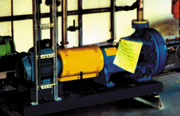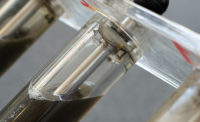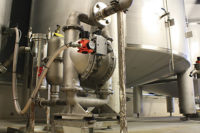
Disc pumps are unique; they operate on boundary-layer/viscous-drag forces that produce a laminar flow with no pulsation. A boundary layer of fluid adheres to the discs as fluid enters the pump. As the discs rotate, kinetic energy is transferred through layers of fluid molecules between the discs, generating velocity and pressure gradients until the entire fluid mass is in motion. The fluid is pulled through the pump in a smooth, laminar flow. In many chemical-pumping applications, the smoother the flow is, the better the product quality and yield will be.
The ANSI disc pump installed in the crystal-slurry, centrifuge-feed application operates the same way. Non-impingement pumping and laminar-flow conditions provide the best protection for shear-sensitive and delicate products. There is almost zero impact on the product. In addition, laminar flow means low NPSHr (net positive suction head required). The NPSH requirements of a disc pump are about half to a third of what is required with conventional pumps.
Centrifuge-feed applications are typically low-flow and low-NPSHa (net positive suction head available). Cavitation is a big problem under these conditions. The disc pump is far less susceptible to cavitation because of its laminar flow and low-NSPH requirements. When cavitation does occur in the disc pump, its boundary layer of fluid acts as a shock absorber, minimizing damage and vibration. Even under low-NPSH conditions, the disc pump suffers little damage or wear. In many cases, disc pumps have continued to operate for years in a state of cavitation without loss of performance. And finally, no impingement means no wear. This means no metal or rubber lining parts contaminate the product.
End users with shear-sensitive products have been able to improve their product yield and enhance plant reliability with disc technology. In the crystal-slurry centrifuge feed, the net result was improved quality, total elimination of leaks and increased reliability. The company reported that production increased and processing time was reduced. Savings were significant enough that the disc pump paid for itself in about one week's time.
The ANSI disc pump meets or exceeds ANSI B73.1 standards, but pumps severe abrasives and levels of viscosity and entrained air that are many times higher than what other ANSI pumps can handle.
For more information, contact Discflo Corp., 1817 John Towers Ave., El Cajon, CA 92020; phone 619-596-3181; fax 619-449-1990, e-mail discflo@discflo.com; or visit www.discflo.com. Or Circle No. 77.

